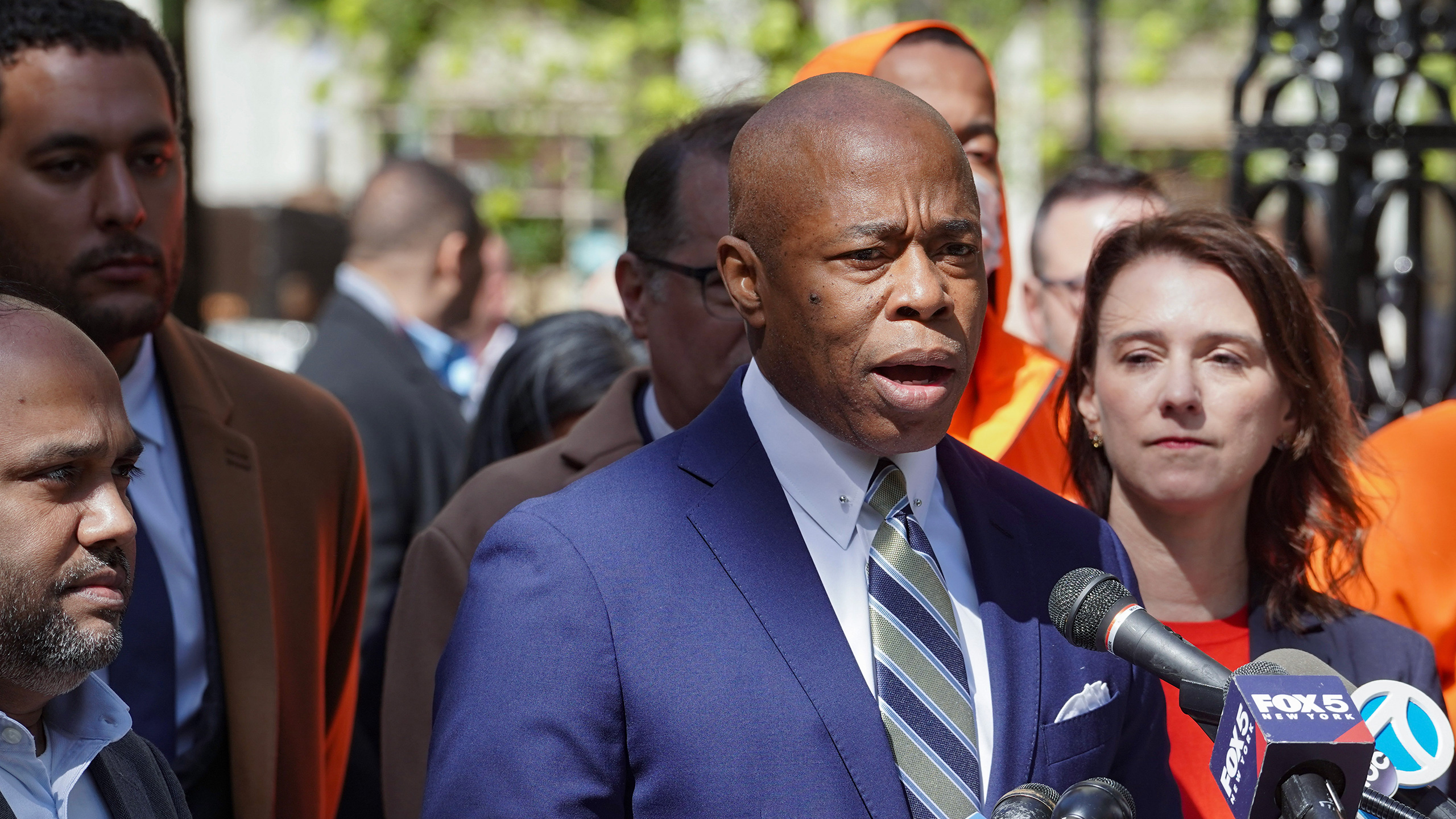Elected officials can determine the success or the failure of early childhood education programs by their policy choices. New York City Mayor Eric Adams has a choice: invest in universal pre-K, or let it starve. Universal pre-K in New York City was once lauded as a national model, but nearly 10 years into the program 30% of seats are unfilled, a provider payment crisis casts doubt on the viability of the program and a city budget showdowns threaten its expansion.
Prior to the Bill de Blasio administration (2014-2021), free pre-K in New York City was a patchwork of means-tested, half-day programs that served just under 20,000 4-year-olds. In his first year in office, Mayor de Blasio delivered on a campaign promise to create an expansive universal pre-K program. By the time of de Blasio’s exit, his administration had created an immensely popular program that served 90,000 children, transformed New York City’s early childhood education infrastructure and was on track to add another 30,000 seats for three-year-olds.
But in the fall of 2022, current Mayor Eric Adams announced a preliminary budget that reallocated $568 million away from universal pre-K and halted the expansion of 3K For All. So, where did things go wrong? Senior Adams administration officials have argued that mismanagement under de Blasio has resulted in the uneven distribution of seats, including the “opening tens of thousands of seats where there isn’t family need and failing to open seats where the need exists.” Nathaniel Styer, press secretary for the New York City Department of Education, claims that a “demand mismatch” has resulted in a large number of open slots in low-income, immigrant neighborhoods of the city like Highbridge in the Bronx, and few open seats in wealthy communities.
For my graduate capstone thesis at the Department of Urban Policy and Planning at Hunter College, I sought to understand why some of New York City’s most economically vulnerable residents are not making use of what should be an economic lifeline: free child care. I conducted research interviews with participants in four key stakeholder groups: parents, child care providers, former staff within the Division of Early Childhood Education, and policy experts. My research aimed to unpack the “demand mismatch” theory and answer two questions:
- Is there an unmet need for universal pre-K in low-income communities that is not captured by the way the Adams administration measures demand?
- Are there barriers to information, access and enrollment that may be contributing to underutilization?
Here are my findings.
Finding: Universal pre-K may not have enough flexibility to match the diverse needs and preferences of New York City families.
Many parents need child care before or after the traditional school day, on nights and weekends, and over the summer. In fact, 43% of children in the United States have at least one parent who works non-traditional hours. The vast majority of New York City’s universal pre-K programs, however, are offered on a school-day/school-year calendar (6 hours and 20 minutes per day; 180 days per year) and only some community-based providers offer extended day and year programs primarily for families who meet Child Care Development Block Grant or Head Start eligibility criteria. Data from the Citizens’ Committee for Children of New York found just 15% of 4-year-olds enrolled in universal pre-K received full-day, year round care and in some low-income communities less than 10% of pre-K seats were full-day, year-round.
Interviews confirmed that so few options for extended care may contribute to low utilization rates in low-income communities. Elliot Haspel, author and expert on child and family policy, explained that “family needs for child care do not exist on a school-year, school-day basis. Often disproportionately, we know that lower income parents and parents of color tend to be those who are working shift jobs, and a high proportion of them are working non-traditional hours… So, the lack of flexibility can certainly be a barrier.”
A former staffer within the Division of Early Childhood Education, who requested anonymity in order to speak with me candidly, told me not being able to offer early or after-school hours was one of the biggest hurdles reported by principals. They also described the lack of extended hours as a “misalignment with what is being offered and what is needed in the community.”
For some parents, inflexible operation times can leave universal pre-K entirely out of reach. One mother, whose daughter is enrolled in a community-based center in Red Hook, said start times for some pre-K centers conflicted with the ferry schedule. Choosing to send their child to one of those programs would mean she or her spouse would be late to work every day, and therefore they did not apply.
Finding: There may be demand for home-based family child care, but that need is not reflected in the composition of universal pre-K.
Enrolling in universal pre-K programs at district schools or formal child care centers may work for some families, but other families prefer different options. A report by the Migration Policy Institute argues that due to a “lack of multilingual staff, rigid schedules, and limited programming that is culturally and linguistically responsive, formal child care centers historically have not fully met the needs of immigrant communities, and particularly low-income immigrant communities.”
Julie Kashen, senior fellow and director for Women’s Economic Justice at the Century Foundation, said that home-based family child care is an option many families prefer, especially those who are looking for a cultural or linguistic match and/or who require extended or nontraditional hours of care. These program options, however, are not offered for pre-K and are very much a minority in 3K programs with typically only a few hundred family child care seats.
A former DOE staffer, who requested anonymity, expressed that home-based family child care providers “are not technically excluded, but the way that the system is constructed ends up resulting in it being really difficult for them to be able to participate.” He explained that New York City’s complex contracting process for its universal pre-K programs can shut family child care providers out, and thus, an arrangement that attracts low-income, immigrant communities remains out of reach.
Finding: Sustained outreach is necessary to engage low-income and immigrant communities, and scaling back the outreach initiatives could contribute to low utilization rates.
The de Blasio administration focused heavily on outreach to reach families who may not typically have a high level of engagement with government agencies. There were borough- and neighborhood-specific outreach teams equipped with materials like palm cards and flyers available in all DOE languages, and there was on-the-ground support, including canvassing, days of action at shelters and events at libraries to bolster enrollment. Coordinated outreach and partnership with trusted community members has proven to bolster enrollment among “hard to reach” low-income and immigrant communities.
My interviews with former DOE staffers, however, revealed that the Division of Early Childhood Education under Adams has been plagued by understaffing and has significantly scaled back outreach initiatives. The Division of Early Childhood Education is 45% understaffed and had the sixth highest vacancy rate across all divisions at City agencies. Members of the neighborhood and borough-specific teams have reportedly been reassigned and there is more focus on automated forms of outreach like emails and robo calls, which are not nearly as effective in engaging low-income families, especially those who may have had previous negative experiences interacting with government agencies or who are undocumented.
After months of negotiation and just a few weeks after my capstone was published, the New York City Council voted to adopt the 2024 fiscal year budget that restores universal pre-K funding and supports efforts to convert 1,800 3K seats from school-day/school-year seats to extended day/extended year seats. The final budget is a huge sigh of relief for early childhood education advocates who feared Adams’ proposed cuts, but the future of universal pre-K remains uncertain.
My research only begins to scratch the surface of this issue, but it does suggest that demand for universal pre-K is more complex than a simple measurement of seats vs. students. As the Adams administration continues to make staffing, strategic and budgeting decisions about universal pre-K, it should not assume that open seats means that there is no demand.
Instead of strategizing ways to reduce the size and scope of universal pre-K, it should invest in resources to help parents navigate the complicated enrollment process and ensure low-income communities can enroll in programs that fit their needs.
Working with organizations like All Our Kin to increase the number of licensed home-based family child care providers who participate in the program, reengaging the outreach teams and strengthening partnerships with on-the-ground trusted community organizations, and offering more extended day, full-year programming options could improve utilization rates in low-income communities.
At a December 2022 press conference, Mayor Adams stated “A true universal program prioritizes and serves every child, every day, in partnership with families and reflects the needs of the community.” It is up to the Adams administration to continue the legacy of universal pre-K and ensure that it is truly universal.

Elise Anderson
Elise Anderson is a recent graduate from the Department of Urban Policy and Planning at Hunter College where she earned her M.S. in Urban Policy and Leadership. She is also the Communications Manager at Vote Mama, the leading source of research and analysis about the political participation of mothers. Anderson worked previously as a congressional press secretary and campaign manager, and has a passion for policy and supporting working families.



